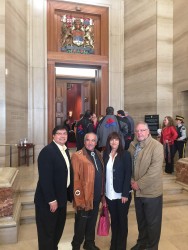Article Origin
Volume
Issue
Year
After close to four hours of submissions on Oct. 8, the Supreme Court of Canada reserved its decision on the Daniels case.
But Congress of Aboriginal Peoples National Chief Dwight Dorey is optimistic that the highest court in the country will uphold the findings of the federal court which ruled that non-Status Indians and Metis are the responsibility of the federal government.
The federal government appealed the decision and the federal Court of Appeal upheld that Metis were included under section 91(24) of the Constitution. However, the Court of Appeal said no decision was needed by the court regarding non-Status Indians as the federal government had conceded that non-Status Indians are included in section 91(24). It was Dorey’s organization, under the leadership of Harry Daniels, that brought legal action against the federal government in 1999. But the case did not go to trial until 2011.
“I was quite pleased,” said Dorey. “Our legal team, their arguments, and the responses and questions coming from the judges suggested to me that we have a good case.”
At the heart of the matter is what the framers of the Constitution intended in section 91(24) of the Constitution Act 1867 when they wrote that the federal government has the legislative jurisdiction for “Indians and lands reserved for the Indians.” Daniels argued that “Indians” at that time included Metis and non-Status Indians the same way it included Inuit.
As it stands now, the federal government has fiduciary responsibility for on-reserve Indians and Inuit. However, the responsibility for both Metis and non-Status Indians falls into a gray area.
“Like we say in the cliché, we’re like the ball that gets tossed between federal and provincial jurisdictions and it’s time for it to be over,” said Dorey.
Mark Kindrachuk, counsel for the federal government, argued that the court had no jurisdiction at this point because the plaintiffs were coming forward with an abstract concept and not challenging specific legislation in a concrete case.
“It’s a sin of omission and not a sin of comission. Isn’t that the problem?” asked one Chief Justice. “The argument is that the federal government denies its jurisdiction and we suffer as a result.... If the government is denying something, as you phrased it, there’s never a legislative context. It’s that the government has refrained from legislating because it denies jurisdiction.”
Christopher Rupar, also counsel for the federal government, noted that inclusion of Metis in section 91(24) did not amount to waving a “magical constitutional wand…. (It) does not resolve the many issues that they’ve raised in this litigation … it provides a false hope that something more, something different can be done. It’s our position that that’s not the case.”
Another Chief Justice stated it was only “false hope” if future elected officials chose not to act on their jurisdiction.
“At least the system would be working in a democratic way because people would know where the responsibility is,” she said.
As a means to battle that “false hope,” Joe Magnet, counsel for CAP, said a declaration that made it clear that the Crown and Metis were in a fiduciary relationship would be necessary as would a declaration that the Crown needed to consult and negotiate with the Metis.
“Having the right to be consulted and negotiated gives us the basic ammunition to go on a political grounds and to say to the federal government, ‘You have to deal with us,’” said Dorey.
The Supreme Court could render a decision in three months to year, he says. But a favourable decision doesn’t mean the end of the battle.
“We have had senior officials in justice tell us years ago, even if you do win this case (that) doesn’t mean we have to do anything. Our argument is that, ‘Yes you do have to do something.’ It will still be a lot of work and some uphill struggling,” said Dorey.
Photo caption: Members of the Congress of Aboriginal Peoples at the Daniels v Canada Supreme Court of Canada hearing, Oct. 8: (from left) National Vice Chief Ron Swain, National Chief Dwight Dorey, board members Wendy Wetteland (New Brunswick) and Robert Bertrand (Quebec).
- 3514 views

